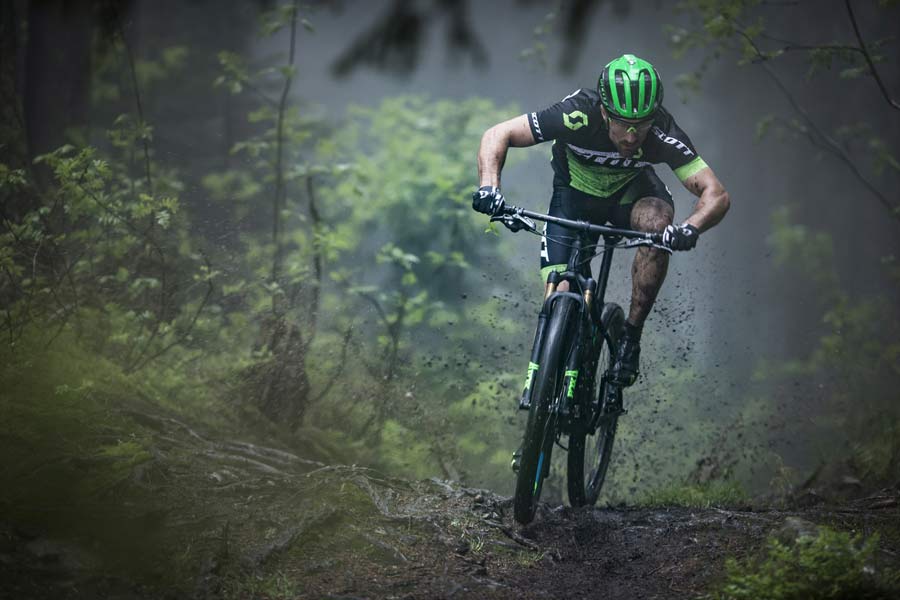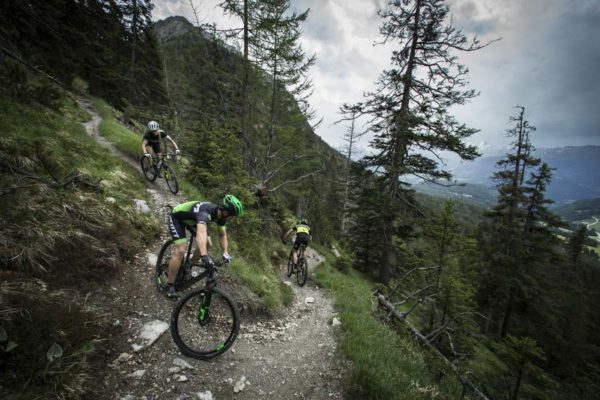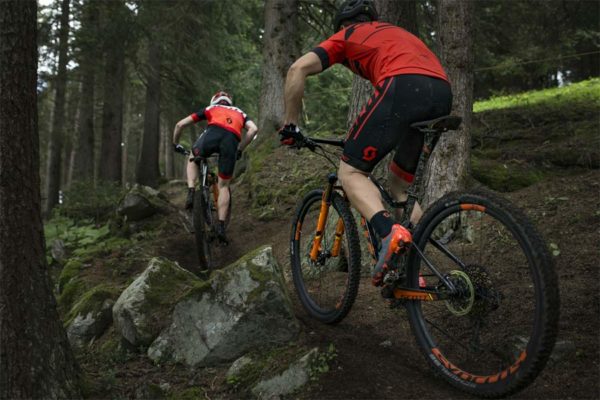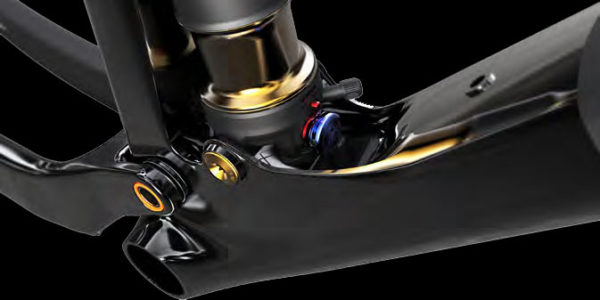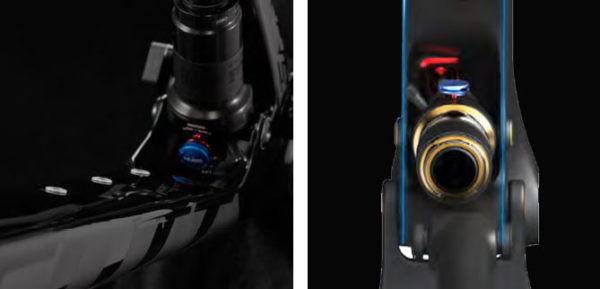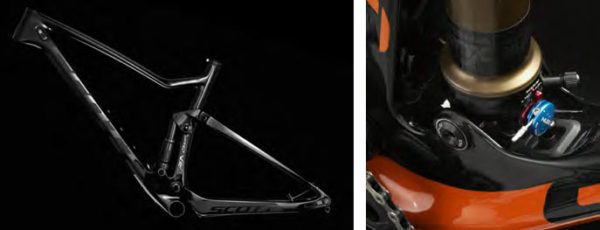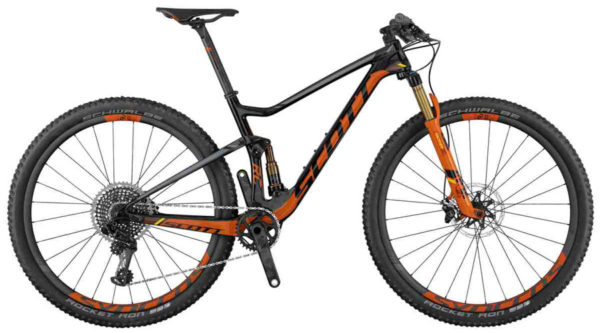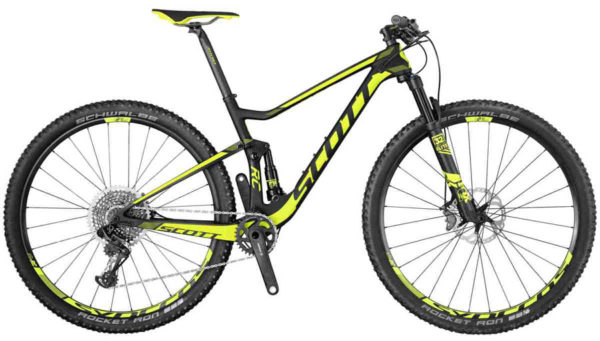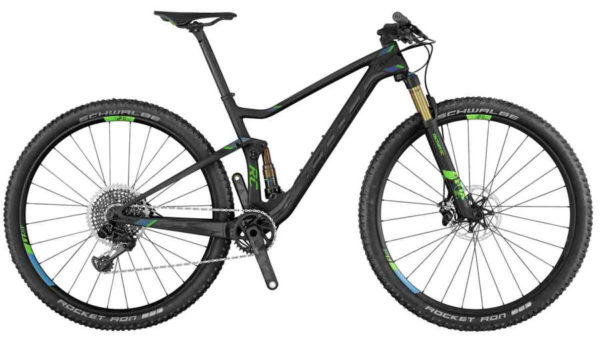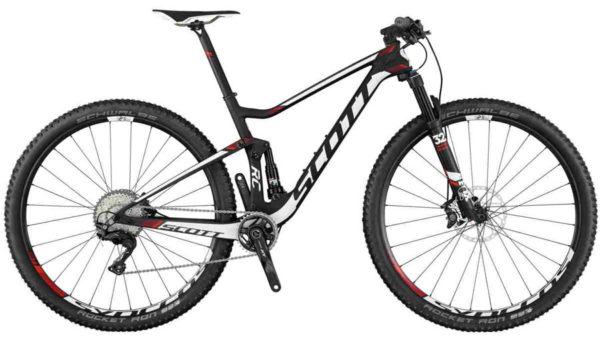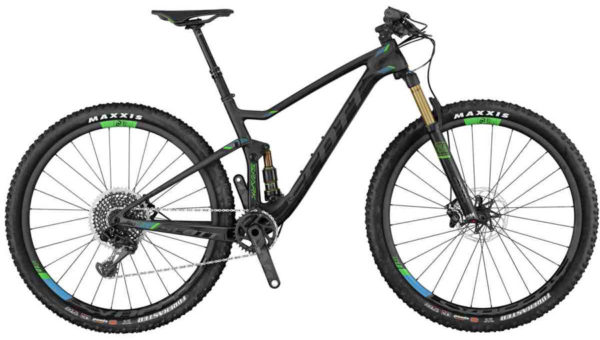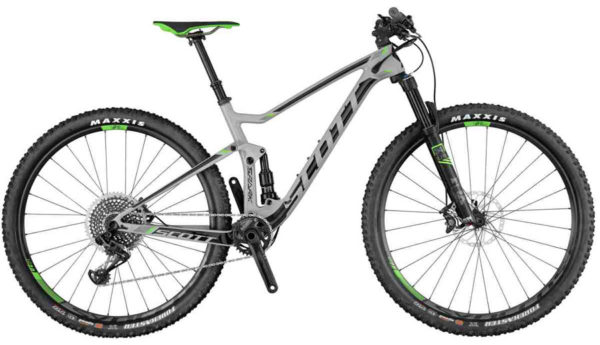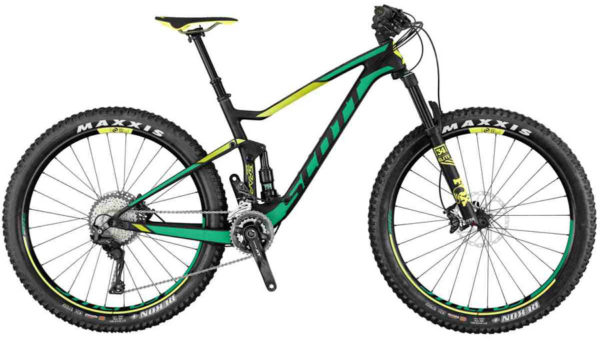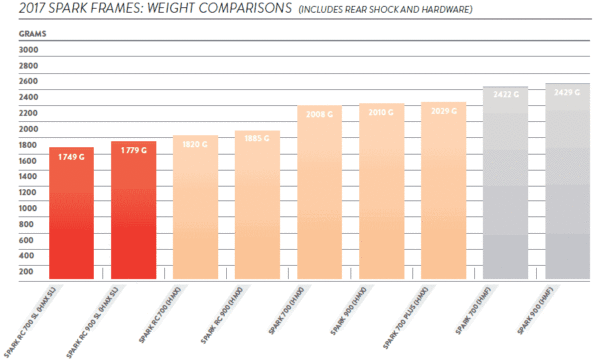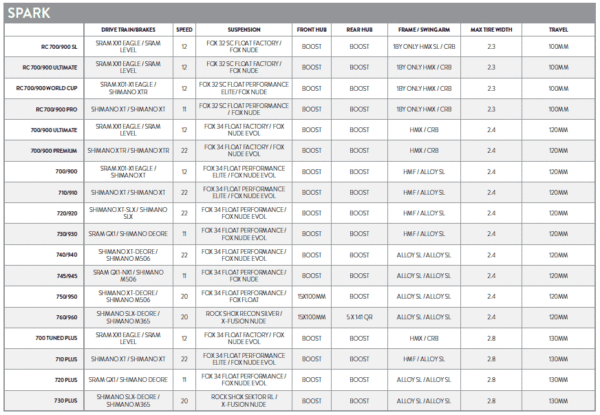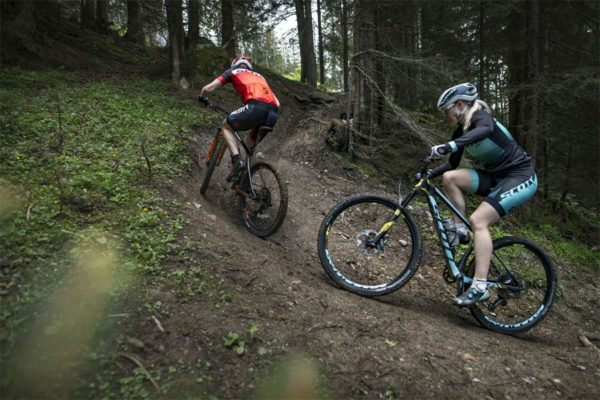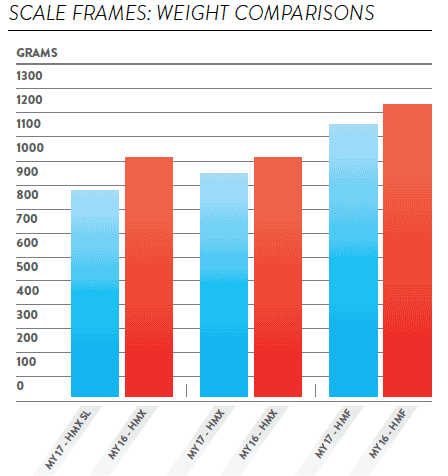Scott has long been known for pushing the boundaries of lightweight on production bikes, and with the new 2017 Scott Spark and Scott Scale mountain bikes, they’ve done it again.
Taking full advantage of recently introduced standards like Boost and Metric Shock sizing, the full suspension Spark RC bikes come in as light as 1,749g… with ALL hardware AND the shock. Considering most full suspension bikes’ frames hit that number without the shock, that’s a very impressive number. And the hardtail Scale measures as low as 849g. Both use a 1x specific design to shave extra grams, but the rest of the bike’s details are where the major weight savings come from and show off the Swiss brand’s talents for making wicked light race bikes…
Both the Spark and Scale are part of Scott’s RC lineup, meaning Racing Concept, which tells you what their intended use is. Both are 100mm travel (front and rear for the Spark), and both use Boost axle spacing to create a stiffer frame and bike. At the RC frame and trim levels, the bikes are designed specifically for 1x drivetrains, too. But, the new designs trickle down to non-RC models that get 2x compatibility…and bump travel to 120mm on the Spark for both the 700 (27.5″ wheels) and 900 (29er) versions.
Starting with the Spark, the most drastic visual difference from years past is the vertical shock. Until now, the rear end had driven a horizontal shock mounted to the top tube. Now, a carbon fiber rocker arm (that weighs half what the old one did) drives an upside down shock parallel to the seat tube. Boost axle spacing opened up room for a wider shock mount, letting them use a trunion-style mount. That gave Fox two extra millimeters stroke length compared to the 2016 model (40mm, versus 38mm) for the 100mm travel RC bikes, and 45mm stroke length on the 120mm travel bikes. That may not sound like much, but small gains in the shock translate to big improvements at the rear axle.
The shock’s placement still allows for large or small water bottles to fit inside the front triangle, with multiple mounts to suit your preference for placement. Carbon fibers like to stay straight (or, at least, avoid sharp corners), so they offset the shock to the non-drive side to maintain a smooth, continuous fiber structure from the downtube through the lower shock mount.
The new single-pivot Spark uses a solid rear triangle, relying on seatstay flex to compensate for the lack of a pivot near the rear axle. The design has been reduced from 18 parts (in 2016) to three, molding the left and right halves as single pieces, plus the brake mount…more on that in a sec.
Like before, higher end Spark models use their TwinLoc travel adjust system with a custom Fox Nude shock to cut travel from 100mm to 70mm, then on down 0mm at lockout (120mm travel bikes reduce to 85mm). Full travel is called “descend”, and the reduced travel is called “traction” mode. Each mode gets it’s own spring rate thanks to the unique method of changing travel. In “descend”, the shock has both a primary and secondary air chamber open for business, creating a larger air volume shock with a little more sag and full travel. In “traction”, the shock is using only the primary air chamber, which reduces air volume and effectively limits the travel. Because it’s not a mechanical adjustment of the linkages, “traction” mode keeps you sitting higher in the travel and uses a little less sag, which makes the bike feel a bit peppier up the climbs. In either mode, the shock rate was designed to keep it supple at the beginning of the stroke, then firm up a bit beyond sag before taking advantage of an air shock’s natural ramp to avoid bottom out.
All cables are run internally from the front of the bike all the way to their destination, which reduces the number of cable stops and other hardware to save weight…and keep it looking very clean.
Furthering the clean look are the integrated brake mounts…
…and dropout/derailleur hanger combo. Both designs use the component mount as the axle support, which minimizes the amount of material used and simplifies the construction process dramatically. The brake mount, which comes in versions for 160mm or 180mm rotors, combines with the simplified rear triangle construction to save 130g. And because it’s anchored at the axle and chainstay, it allows the seatstays to flex as needed.
On the driveside, click that image to enlarge and you’ll see that the threaded thru-axle insert is one with the derailleur hanger. That part simply slides into the carbon frame to support the axle without having to be bonded in or overwrapped, yet is supposedly more durable. The part is available for Shimano direct-mount or SRAM rear derailleurs.
More integration comes from the DT Swiss thru axle with removable Torx 25 handle, custom chain guide and lots of new Syncros SL parts that both look good and drop weight from the high end bikes.
All of those changes come together with geometry updates to create a bike that’s modernized with the “long and low” trend. Compared to the 2016 model, it has a 17mm longer reach and a short 70mm stem, 17mm lower stack, 28mm lower standover, 13mm shorter chainstays and a 1.3º slacker head angle (68.5º). The seat tube, however, gets 1º steeper (73.8º) to put you over the pedals.
The Spark’s range tops out with the SL, which gets their new HMX-SL carbon fiber along with some new layup tricks to have the lightest frame. A basic spec highlight and frame material chart follows a visual run down of the upper half of the spec. There are a lot of bikes, women’s included, with a wide variety of carbon fiber spec, carbon/alloy mixes and full alloy bikes.
Next down is the Spark RC World Cup…
Then the Spark RC Ultimate…
The Spark RC Pro…
The non-RC Spark Ultimate…
The Spark 900…
and from there, the models use Scott’s numbering system, where 700 equals 27.5 wheels, and the 900 means 29er wheels. Lower numbers are higher spec, so the 700 is better than the 710. Shown directly above is the women’s Spark Contessa 710 Plus. The “plus” refers to the 27.5+ wheels and tires, which also comes with a slight bump in front travel to 130mm, keeping 120mm in the rear.
Lots and lots of options for most any budget. Check their website for full specs and prices.
2017 Scott Scale
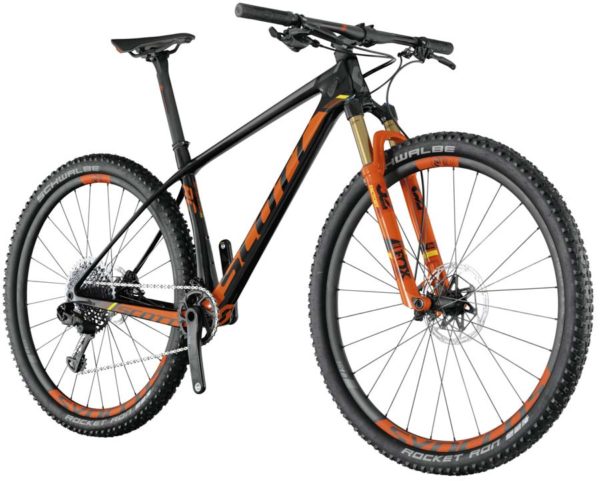
Like the Spark, the new Scale is a blend of fibers that create a stiff yet comfortable frame. They also save weight. The new fiber types used on the HMX-SL model create the most drastic weight savings for an 849g frame (27.5).
The HMX and HMF frames also drop weight from the improved layup, saving 82g (966g frame) and 166g (1,099g frame) respectively. The HMX-SL also gets weight savings from using only a clear coat and ultralight decals rather than painted logos (the Spark uses the same paint strategy, both yielding about 50% savings over a standard painted frame).
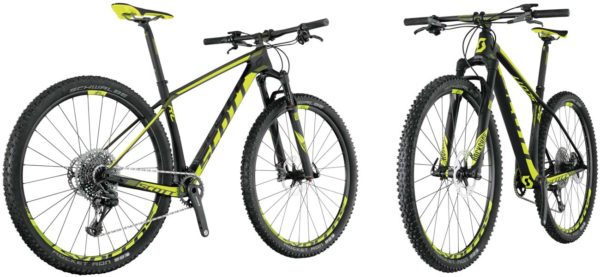
Without the benefit of suspension, the frame has to take up the hits. But to be a race bike, it’s gotta remain laterally stiff and transfer power effectively. So the bottom half of the frame is stiffer than the top, and the top half allows seat tube-to-seat post flex, so the rider is slightly suspended. The seatstays also provide a bit of flex, helping keep the rear wheel planted. Overall, they claim a 47% improvement in rider comfort.
Shared features include the brake mounts, rear derailleur/axle mount insert, stealth rear axle lever tool, internal full length cable housing, Boost wheel spacing and 1x-only frames for the RC level bikes. They also use a lot of the same Syncros SL cockpit parts to streamline the look and save more weight. The Scale is compatible with stealth dropper posts, too.
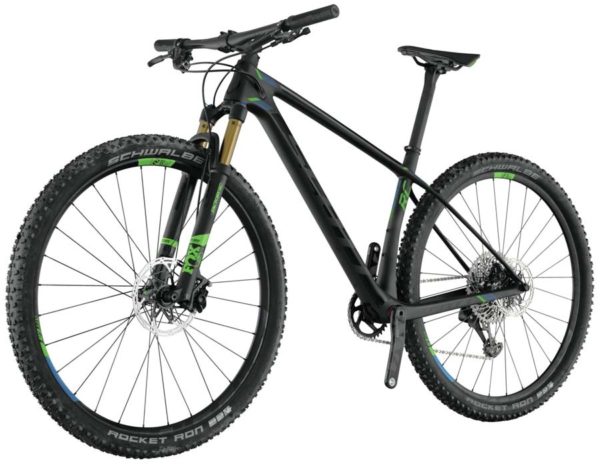
Geometry changes are similar, with the chainstay getting shorter by 13mm on the 29er and 2mm on the 27.5. Reach is 17mm longer, with shorter stems to keep the riding position similar, and stack height is slightly reduced. The seat tube gets 1.1º steeper.
The lineup runs virtually lockstep with the Spark, running from top end carbon down to alloy frames, offered in both 900 (29er) and 700 (27.5), and Contessa and Plus bikes, too. The addition is an e-Scale electric motor assist version. Full specs and geometry charts on their website.
